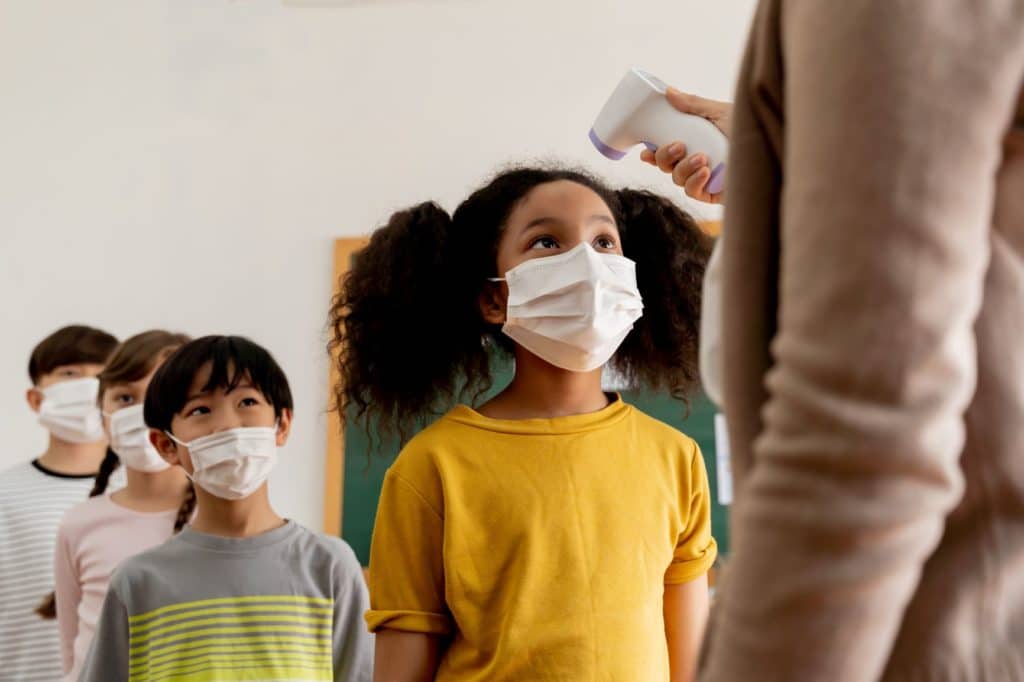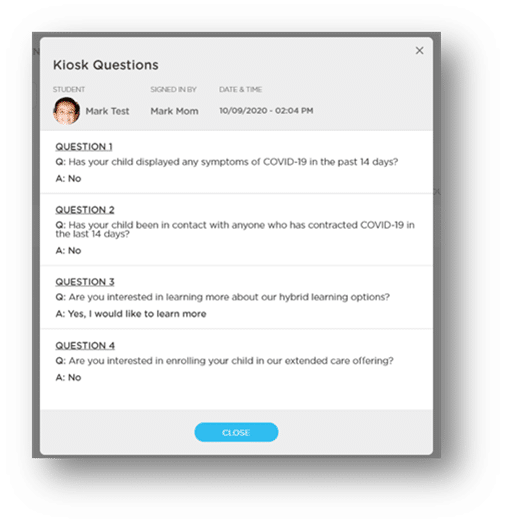
Is your child care program performing health screenings to check children and visitors for COVID-19 symptoms?
Despite the success of the U.S. vaccination program up to this point, COVID-19 infections are still a risk for members of the community who have yet to be vaccinated. That includes community members with religious exemptions or allergies to vaccine ingredients, younger children and those who simply haven’t made time yet.
Performing basic health screenings is one of the best ways to keep everyone safe, reduce the risk of COVID-19 transmission at your facility, and ensure that your doors stay open so you can keep serving the community.
In this week’s blog post, we’re taking a closer look at the importance of health screenings in child care, who should receive them, best practices, and the most important questions you should be asking visitors before they are allowed into your building.
Health Screenings in Child Care: Why They Matter
Our national vaccination rollout has been a huge success this year, with over 266 million doses administered so far and more than 35% of Americans fully vaccinated – but that doesn’t mean it’s time to let our guard down.
In fact, it’s more important than ever that we remain cautious. That’s because of the new threat of COVID-19 variants – mutated versions of the virus that have emerged from the UK, South Africa and India. We don’t know much yet about these new variants, but early reports suggest they could be more infectious, result in more severe illness, and could even be resistant to vaccines.
All of this doesn’t mean we should panic or be afraid – but we should recognize that our fight with COVID isn’t over and take the proper steps to keep our communities safe. Maintaining strict protocols for health screenings in your child care setting can allow child care providers, teachers or directors to identify individuals who may be ill with COVID-19 and prevent them from entering the facility and spreading it to others.
Who Should Receive Health Screenings in Child Care Settings?
To maximize the impact of your health screening program, we recommend conducting a basic health screening for every person who enters your facility. That includes parents, children, teachers, child care providers, administrative and supportive staff, and contractors. Health screenings are for everyone!
The most common model we’ve seen for child care centers involves the assignment of a dedicated person – often a child care provider or administrator – to conduct screenings at the facility entrance. That person takes responsibility for conducting health screenings on everyone who enters the facility. They should be given the authority to deny entry to any person who presents COVID-19 symptoms, or whose responses to screening questions indicate an elevated infection risk.
Health screenings in child care settings must be unbiased and applied equally to everyone – that’s why it’s important to screen every person and make sure that nobody receives special treatment.
Health Screening Forms in Child Care: Questions to Ask

Now let’s take a closer look at how to conduct health screenings in child care settings. Below, we list the most important points you should cover when completing health screenings for COVID-19.
Ask About COVID-19 Symptoms
How to Ask: “In the past 24 hours, have you experienced any symptoms of COVID-19 such as fever, dry cough, chest pain, shortness of breath, or loss of taste or smell?”
Why It’s Important: Fever and loss of taste/smell are two of the tell-tale signs of COVID-19 infection. Asking directly about these symptoms is one of the easiest ways to tell if someone is a risk and should not be allowed entry.
Ask About Cold/Flu Symptoms
How to Ask: “In the past 24 hours, have you experienced any cold/flu symptoms such as a fever, coughing, sneezing, runny or stuffy nose, or sore throat?”
Why It’s Important: If someone is coughing, sneezing or has a runny nose, they might be contagious with a common cold or influenza virus. There’s also a fair amount of overlap between cold/flu symptoms and COVID symptoms. Either way, detecting those symptoms in a health screening gives you the opportunity to deny entry and prevent others from getting sick.
Ask About Positive Diagnosis
How to Ask: “In the past 10 days, have you tested positive for COVID-19?”
Why It’s Important: If someone has tested positive for COVID-19 in the past 10 days, they should be self-isolating until they can produce a negative test. Allowing them entry could result in them transmitting COVID-19 to staff and children in your child care program.
Ask About Household Members
How to Ask: “In the past 10 days, has anyone in your household tested positive for COVID-19?”
Why It’s Important: If a visitor to your center is living with someone who has COVID-19, they may also be carrying the virus. Even if they have no symptoms and have not tested positive, it’s best to play it safe and ask them to come back after they can produce a negative test result.
Ask About Close Contacts
How to Ask: “In the past 10 days, have you been in close contact with anyone who has tested positive for COVID-19?”
Why It’s Important: If a visitor has been in close contact with a confirmed case during the past 10 days, you may want to have them wait a few days and check themselves for symptoms before allowing them into your child care facility.
Ask About Travel
How to Ask: “In the past 10 days, have you traveled outside the country at all?”
Why It’s Important: Data shows that a significant portion of COVID cases originate from international travel. If a visitor tells you they just got back from a trip outside the country, you may want to ask them to wait a few days and check themselves for symptoms before they enter the child care facility.
Health Screenings in Child Care: Best Practices
Create a Designated Screening Area
Set up an area outside the child care facility where health screenings will occur. Use tables or floor/ground markings to funnel visitors into the screening area and prevent them from trying to bypass the screening. Your screening area should ideally be located outdoors, since indoor spaces are more conducive to COVID-19 transmission.
Encourage and Enforce Social Distancing
During peak times, you may have a line-up at your health screening area of visitors who wish to enter the building. Be sure to set up markings and signage that encourage visitors to maintain social distancing while they wait their turn for their health screening.
Practice Regular Hand Hygiene and Wear PPE
If you’re performing health screenings in a child care setting, you’re going to be in close contact with individuals who may have COVID-19. Because of that, it’s extra important to wear proper PPE – a proper face covering, face shield, gown and medical gloves. Be sure to remove and discard PPE after performing health screenings and practice appropriate hand hygiene to protect yourself from germs.
Complete and Record Temperature Checks
In addition to having visitors complete the health screening form (or asking them questions and completing it yourself), you should also be completing temperature checks on all visitors and recording the results on their health screening form.
Normal body temperature ranges from 97.7 – 99.5℉. Anyone with a temperature over 100.4℉ has a fever according to the CDC definition. That means they’re having an internal immune response to an illness and shouldn’t be allowed into your child care facility.
Securely Store Completed Health Screening Forms
Once you’ve collected all the most important health screening information from your visitor, you can make the decision to allow or deny entry to the facility. You should record your decision on the health screening form. Completed health screen forms should be stored in a secure location where they won’t be lost and can be reviewed later on.
Manage Health Screenings at Your Center with Procare Solutions

Conducting health screenings at your center is one of the best ways to limit COVID-19 transmission within your child care community – and Procare is here to help!
Our years of experience and expert community give us the wisdom to know what your business needs to succeed. Procare provides easy-to-use solutions that support COVID-19 safety at your center, including child care security and contactless check-in technology (which includes the ability to ask health-related questions in the app), as well as digital storage for health screening forms and other child care records.



